The subtleties of preparing for the wedding
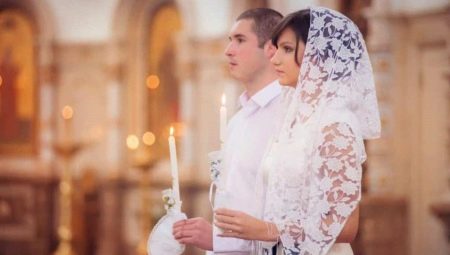
Today, the wedding can be considered an outdated ceremony that has lost its value, however, for some newlyweds and more experienced spouses, it is still relevant. The wedding ceremony is an important event in the fate of the family, because it unites the immortal souls of people forever, which means that after death the souls of this couple will meet in a better world and will be together. A wedding is a very important step, for which it is important to be prepared morally and spiritually, which means not only deciding how important it is for the family, but also going through a whole string of important preparatory traditions that will strengthen the consciousness of the need for a wedding and set the newlyweds in the right mood.
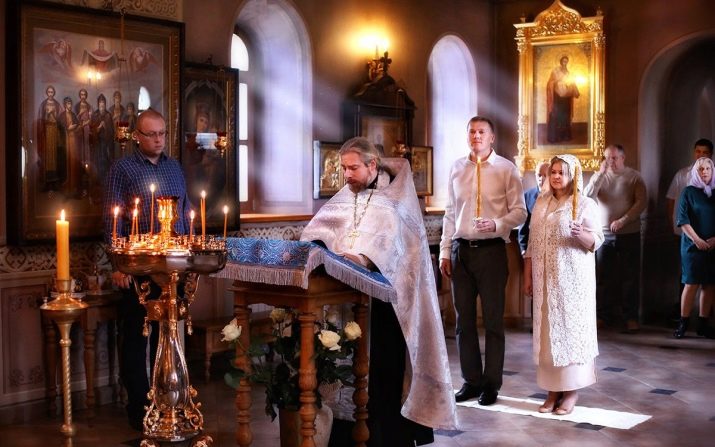
Fundamental rules
Like any other ceremony, a wedding is subject to a certain scenario of actions and a number of immutable rules. The newlyweds must remember each of them and warn their guests about them, so as not to offend the feelings of the ministers of the church.
- Loud conversations, laughter, rotozy, the use of swear words, pointing at church decoration with a finger are unacceptable in the church. These are not only church rules, but also generally accepted rules of etiquette. Violation of these simple rules indicates a person's bad manners.
- There is a strict dress code in the church, violation of which means that a person has a bad soul and is impious.
- Witnesses and parents of the newlyweds must necessarily confirm their consent to this marriage and bless the newlyweds.
- Some holy fathers ask for a marriage certificate as confirmation of the seriousness of the intentions of the young.
- Most churches do not marry minors, although according to the rules the restrictions are as follows: boys are not younger than 18, and girls are not younger than 16.
- Women over 60 and men over 70 are not allowed to attend the wedding. This is due to the fact that such a marriage is doomed to sterility, since the fertile age of the newlyweds is long gone. However, this rule does not apply to couples who are legally married and have children.
- The wedding of blood relatives is forbidden.
- Weddings of couples in which one or both partners have not divorced previous legal marriages is unacceptable. And, of course, a wedding is unacceptable for previously married people.
- If one or both spouses have had 3 or more marriages before, such people are also not married, since they are unreliable.
- Both newlyweds must be baptized Orthodox.
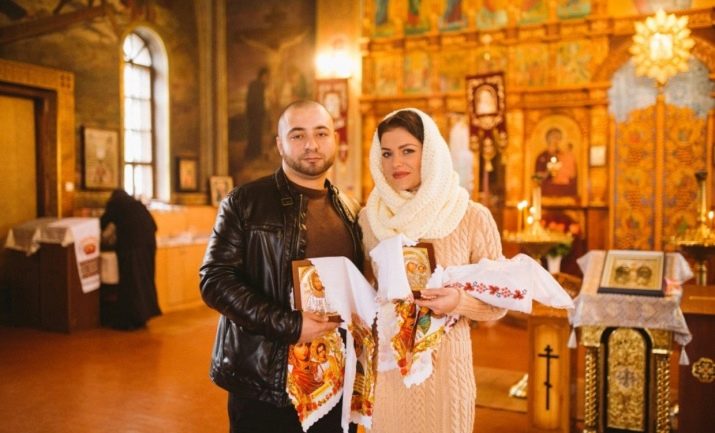
How to sign up?
The question of how to sign up for a wedding is not entirely correct. In fact, it is not as easy as it seems. In this case, many churches have their own rules. In order to carry out the wedding ceremony, you will have to go through an interview with the priest. During this interview, the clergyman learns about the life and acquaintance of the young, assesses their intentions. In addition to the interview, the young people will have a large list of preparatory rituals, which the priest will also tell in detail about.
If the priest remains satisfied with the newlyweds, most likely he will give his blessing for the marriage and offer to choose a date. In the opposite situation, the young will receive a number of recommendations, following which you can convince the priest of the seriousness of their intentions.
In addition to the interview, you will have to make a charitable donation to the temple. As a rule, each church has a fixed amount that it is desirable to pay, it can range from 1,500 to 5,000, depending on the size of the church and the demand for its services.

What do you need to buy?
The sacrament of a wedding is a ritual carried out according to a single, strict scenario.
To carry it out you will need:
- an icon of the Mother of God (sometimes the Savior or both);
- church wine, which can be purchased at a church shop or Cahors shop;
- napkins or handkerchiefs for candles;
- candles;
- wedding rings;
- towel.
The towel should be large so that the newlyweds can safely stand on it.
Previously, girls embroidered such towels on their own for the wedding, putting a ritual meaning in them. Today, a towel is easier to buy. The drawings on it should symbolize the long joint journey of the young, so pairs of pigeons or swans, rings and flowers will be appropriate here.
Wedding rings should be modest, with rings engraved with church symbols or simple, classic wedding rings.
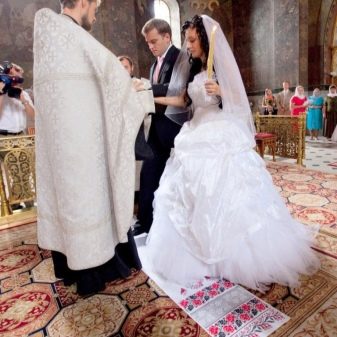
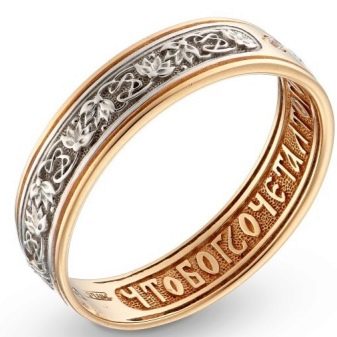
As for the icons, the ideal option is family icons, with which the parents of one of the newlyweds got married. If there are none, then parents can purchase icons and donate them to the young.

How to Prepare?
For the wedding, the young must cleanse their soul and body from wicked thoughts, sins of a previous life, and so on. Therefore, there are strict rules for preparing for the wedding. It includes fasting, confession and communion.
To cleanse your soul as much as possible before the wedding, you need to properly prepare for it, and you should start with fasting. The length of the fast does not really matter, however, it should be long enough for the young to realize its purpose. During fasting, meat and dairy products, fish and seafood, eggs should be excluded from the diet. The use of any alcohol is unacceptable. During this period, you can eat cereals, vegetables, fruits, mushrooms.
However, some changes in the diet of those who are fasting are possible if adequate nutrition is necessary for medical reasons, in which case the rules of fasting should be discussed with the priest.

A week before the end of the fast, you must give up sexual intercourse. Fasting is a way of cleansing the spirit, and for newlyweds it is also a reason to devote time to each other, spend time strengthening the spirit, read prayers together and ask for blessings from the saints.This rule is important for both newlyweds and those living in marriage, since they are equal in the face of the Orthodox Church. In addition, this rule does not end with the end of the fast. It is necessary to continue fasting in an intimate sense until the very first wedding night, which will take place after the wedding ceremony.
On the eve of the wedding, or a few days before it, it is imperative to confess. Confession is a conversation with a priest about everything that haunts the soul. During this conversation, you need to confess your sins and mistakes, do it sincerely and voluntarily. This will help free the soul from the burden of sins and will allow a purified, renewed person to enter into marriage. After confession, one must not sin, it is important to observe the commandments of the Bible as carefully as possible, to control one's thoughts, not to allow bad thoughts, so as not to have time to accumulate new sins. After confession, you need to give generous donations to the poor and disadvantaged with an open mind in order to confirm the purity of your soul.
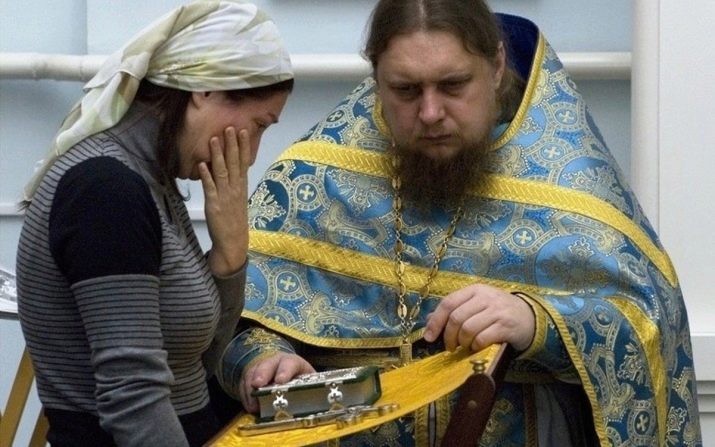
The priest will hold the sacrament on the wedding day before the ceremony itself. As a rule, this happens during the morning liturgy. Young people are invited to taste the "blood and flesh" of the Holy Spirit - a sip of wine and a piece of bread. This rite is intended to introduce young people to holy action, to bestow them with divine grace.
It is important to remember that you cannot skip a single stage of preparation, since they are all designed to cleanse the young as much as possible before the wedding. The newlyweds should enter into a new life without the burden of a past life.
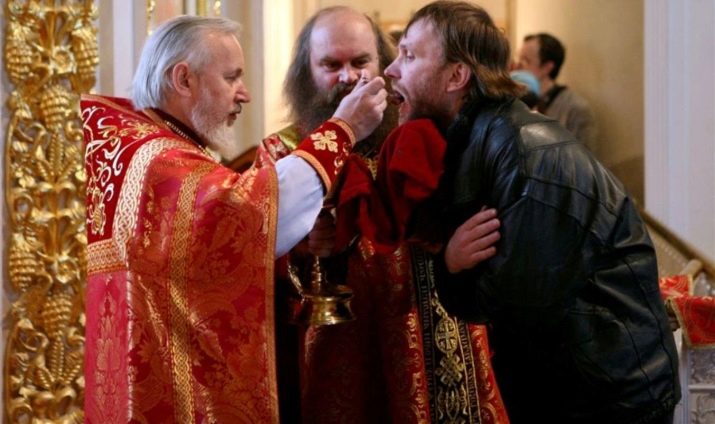
You will learn how to prepare for the wedding by watching the following video.
What to wear?
The church is a temple, which must be entered with a pure soul and respect for its servants. Here, as nowhere else, it is important to strictly adhere to the culture of appearance. The very clothes of newlyweds should speak of the purity of their souls and their piety.
In the case of the groom, the witness, and the male guests, there is nothing particularly difficult. The main rule for a man in church is the prohibition on wearing hats. For the rest, there are a number of simple guidelines. For example, you shouldn't choose too bright, flashy colors of a suit or accessories. The Bible teaches its followers to be modest and restrained; bright colors in clothes are contrary to these tenets. For the same reason, it is worth removing rings, too flashy watches, chains, etc. Jeans, sneakers or sneakers, shorts, T-shirts and other elements of "street" clothing will look uncultural and inappropriate in the church. Better to opt for formal suits in shades of gray, black or blue or trousers and a modest, discreet jumper.


In general, the same rules apply to brides, witnesses and female guests, but there are many more subtleties that should be taken into account. So, for girls in church, it is unacceptable to be bareheaded. Guests at the wedding can give preference to elegant hats, light scarves, and a veil is ideal for the bride.
When choosing a veil, you should make sure that it covers your entire head; for a wedding, it is better to choose a veil that covers your hair and face.
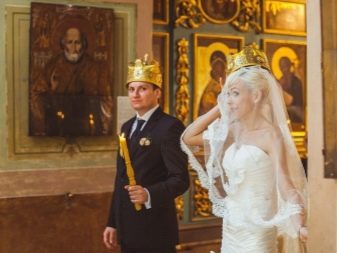
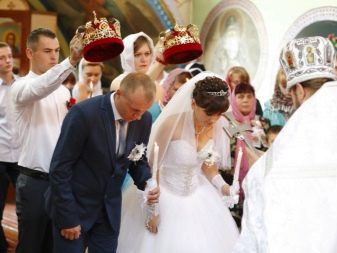
It is unacceptable for women to be in the church in trousers, and the dress must necessarily hide the knees. The bride should even opt for a floor-length dress, since it is such an outfit that is a symbol of innocence. The shoulders and arms must be at least 2/3 hidden by the clothes, that is, the elbows must be under the clothes. Therefore, the bride should choose a dress with sleeves or complement an open outfit with a bolero with sleeves.
The color of women's dresses should be chosen the lightest - this symbolizes the purity of thoughts, which is why brides most often wear white dresses.
The bride, bridesmaid and guests should remember that a wedding is a rather lengthy ceremony that will have to be done while standing. In this regard, it is worth taking care of comfortable shoes.
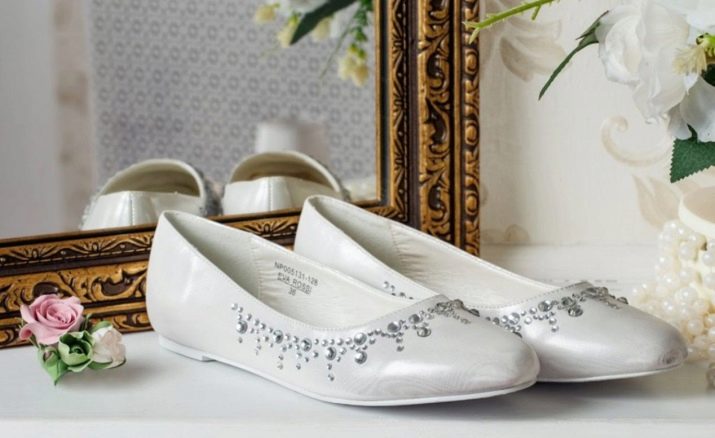
The bride should exclude jewelry as much as possible, this is especially important in the case of her hands, because a new, most important piece of jewelry will appear on the bride's handle - a wedding ring. The abundance of decorations in the church will add vulgarity and cheapness to the image of the bride. In addition, gloves will be inappropriate in the church, since they will have to be removed before exchanging rings - this is at least not aesthetically pleasing.
In preparation for this ceremony, it is worth remembering about the special make-up. There should not be too much makeup on the bride's face. The emphasis should be placed on the eyes, and it is better not to paint your lips at all, because during the ceremony you will have to kiss the Bible and icons - it is not very decent to leave traces of lipstick on such things.
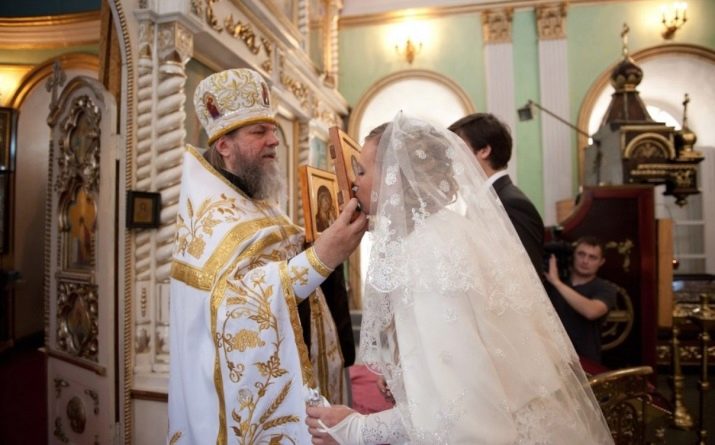
What do witnesses need to know?
The tradition of inviting honorary witnesses to the sacrament of a wedding is rooted in the distant past of Orthodox Russia. Once upon a time, a wedding was the only way to document a marriage, in those days there were no other registers, except for the parish book. In order for the holy father to be confident in the readiness of the young for marriage and their pure and serious intentions, people were needed who could confirm all this. As a rule, these were faithful parishioners of the church who knew the newlyweds well. Honorary witnesses gave recommendations about the newlyweds, however, the witnesses themselves became the successors of this couple (almost like in baptism - godchildren). The newlyweds were to become an example for their witnesses.
Today, wedding options are permissible with and without witnesses. The main criterion in the selection of witnesses is that they must also be baptized Christians who recognize the value and importance of the sacrament of the wedding. During the ceremony, they do not have too many responsibilities: they must hold the crowns over the heads of the newlyweds and give the rings.
It is worth noting that keeping the crowns over the heads of the newlyweds is not an easy task. The crowns are quite weighty and you have to hold them with your arms outstretched, which is quite difficult.
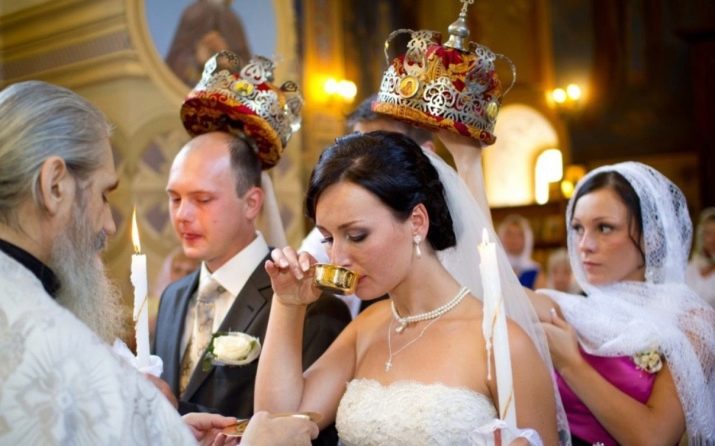









In our time, preparation for the wedding is not quite so strict.